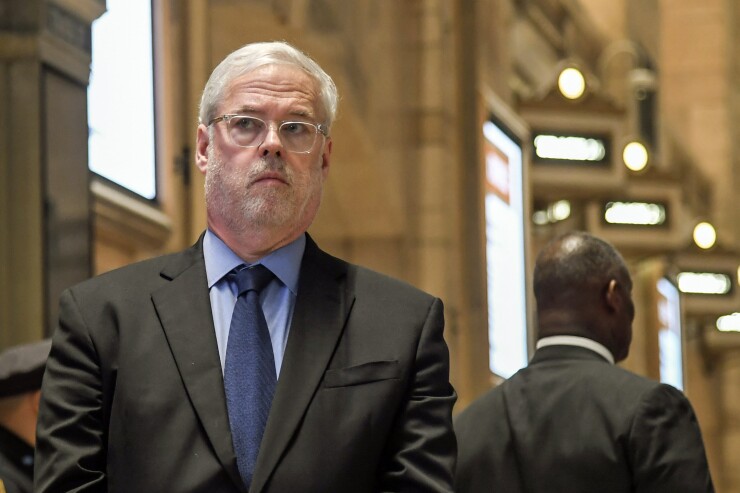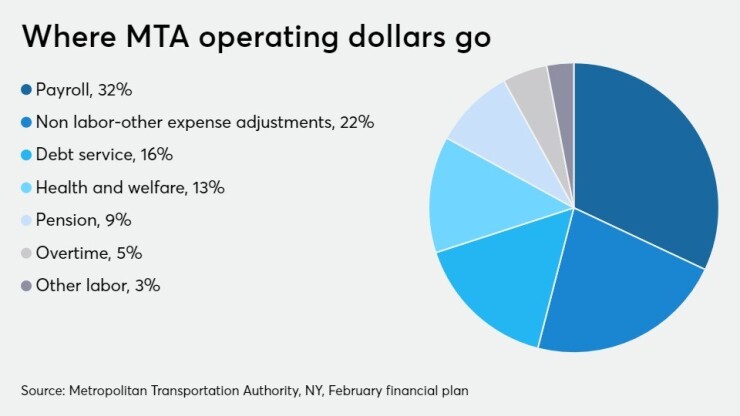Delays in implementing congestion pricing could make funding for New York Metropolitan Transportation Authority's $51.5 billion capital program "precarious," Chairman Patrick Foye said.
Foye spoke during Wednesday's meeting at which the authority's board ratified $1 billion for a new credit backed by an internet sales tax, part of the congestion pricing package lawmakers passed last year.

Revenue from a mansion tax was also part of the package, intended to boost capital funding for the authority, which operates the city's subway and bus system.
Chief Financial Officer Robert Foran told board members that debt service and issuance will rise "significantly," by $742 million, over the 2020 to 2024 plan period. A state review board approved the capital plan last month. The MTA, said Foran, expects to issue $7.3 billion in related bonds over the period.
The MTA is one of the largest municipal issuers with roughly $45.3 billion of debt, including special credits.
The scheduled January launch of a central district tolling plan for Manhattan is up in the air over reported bickering between state and federal officials over what level of environmental studies are necessary, even with no federal money involved.
Echoing Gov. Andrew Cuomo's comments from a week ago, Foye accused federal officials of holding congestion pricing hostage and said the MTA, which operates New York City's subways and buses, is doing "everything in its power" to assure the tolling plan begins on time.
"I think [it's] a wrongful and cynical use of the environmental process to impede a transaction that is a huge environmental positive,” Foye said after the meeting in Lower Manhattan. "There's significant risk to $18 billion of the $51 billion thanks to recalcitrance in Washington."
That includes $15 billion from the congestion pricing package and $3 billion for the next phase of the Second Avenue subway line extension along Manhattan's East Side.
Foye still expects congestion pricing to materialize but if not, "we'd have to make some very, very difficult choices," he said without elaborating.
Prospective delays, meanwhile, add to the uncertainty among state and city elected officials, the capital markets and transit advocates about the immediate future of the state-run MTA, notably after the resignation of its New York City Transit President, Andy Byford.
Byford, frustrated at what he considered micromanaging from Albany and a diminished role under a Cuomo-crafted transformation plan, left Friday amid a media frenzy. Cuomo on Tuesday named Sarah Feinberg, a Cuomo board appointee and chairwoman of its transit and bus committee over the past year, as interim NYCT president.
Feinberg is a former administrator of the Federal Railroad Administration, the sole safety regulator of the U.S. rail system. She will start her new duties March 9 while the MTA conducts a national search for a permanent hire.
"This is a great time to come in and offer a steady hand as we shift a bit here," said Feinberg, who as a board member worked closely with Byford. She is stepping down from her board role.

MTA-supported debt service, despite the borrowing, will remain just below 20% of operating revenue during the plan period, Foran said during a briefing on the rolling February financial plan. That level is now 16%.
The increased debt, he added, would not affect the operating budget.
"Our next step with respect to this [new] bond credit will be to get it rated, to issue an RFP [request for proposals] for trustee services, and we anticipate our first issuance of the sales tax bonds sometime this summer," finance director Patrick McCoy said.
Asked Wednesday whether the state and MTA could proceed on congestion pricing without federal approval, Foye said: "I think everything is on the table. Every serious, reliable option is being considered."
Such a move could trigger litigation, though lawsuits over congestion pricing may loom anyway. "I assume we'll have to litigate it and I believe we'll prevail," Foye added.

Infrastructure expert Nicole Gelinas said the MTA could step up preliminary work.
"I think the MTA could be doing a lot more without federal approval," said Gelinas, a senior fellow with the Manhattan Institute for Policy Research.
The authority, Gelinas said, could appoint members to the traffic mobility review board and debate what exemptions to allow under the plan, such as for special buses. Roughly 30 groups have applied for exemptions.
"It's a months-long process, not something you should be doing in the middle of the night," she said. "This has nothing to do with Trump."
New York City transportation Commissioner Polly Trottenberg has been working with state and MTA officials on transitioning to the tolling mechanism.
"A little fireworks the last couple of weeks with the feds, but in the long run we'll have congestion pricing," Trottenberg said Tuesday after a City Council oversight hearing on the future of the Brooklyn-Queens Expressway.





